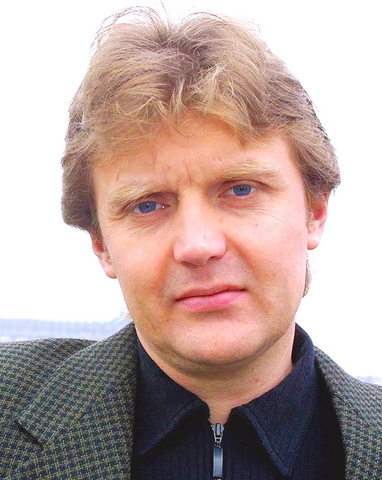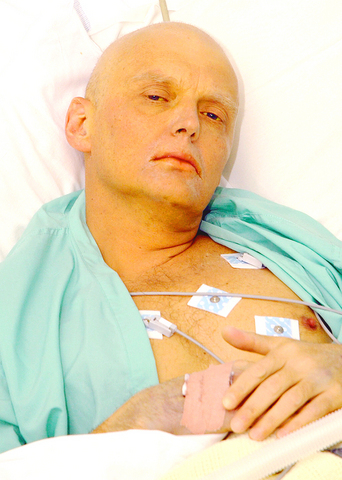British counter-terrorism police have taken on the case of a former Russian spy and critic of Russian President Vladimir Putin who was in intensive care yesterday in a London hospital after an apparent poisoning.
In Moscow, meanwhile, the authorities said "we have nothing to do with what happened to" Alexander Litvinenko, a former lieutenant-colonel in Russia's Federal Security Service (FSB), the successor to the Soviet KGB.
Though they have no evidence, Litvinenko's friends blame the Kremlin for his Nov. 1 poisoning by thallium, an odorless and colorless toxic metal that used to be used in rat poison.

PHOTO: AP
The transfer of his case to London's Metropolitan Police's Counter-Terrorism Command, SO15, indicates the investigation has been given a high degree of importance. Litvinenko has also been placed under police surveillance.
Litvinenko was moved to intensive care on Monday as a precaution following a slight deterioration in his health, doctors said, but he is still listed as being in "serious but stable" condition.
Recent pictures of the former spy released by the hospital showed him lying in green hospital garb, his bald head tilted slightly and his eyes half open, looking gaunt and weak.

PHOTO: AFP
Alexander Goldfarb, a friend who helped Litvinenko defect to Britain and become a British citizen a month ago, found him "more tired today, more exhausted" during a hospital visit on Monday.
Goldfarb added that because Litvinenko's bone marrow was not functioning there was a risk that his heart or kidneys could fail.
In attempting to determine how he became ill, police were interviewing possible witnesses, including the victim, examining his movements around the time of the apparent poisoning, and closed-circuit television footage. They were also awaiting the results of toxicology tests.
Goldfarb said Litvinenko had confirmed to him that he had "briefly" met two Russian men for tea in a hotel in central London on Nov. 1 before meeting an Italian academic for lunch.
After meeting the Italian, he began to feel ill. Litvinenko's friends have dismissed suggestions that the Italian was involved.
One of the two Russian men that met with Litvinenko was Andrei Lugovoy, a one-time head of security at a television station owned by controversial Russian businessman Boris Berezovsky, according to the Daily Telegraph.
The newspaper reported that Litvinenko met with Lugovoy, whom he knew from Moscow, and another man, identified only as Vladimir, whom he did not.
Goldfarb and other friends of Litvinenko suspect that the FSB was out to get the outspoken defector, who was granted political asylum in Britain in 2001.
"It's linked to Moscow and the FSB," Goldfarb said, adding that Litvinenko had written two books accusing the Russian secret services of criminal activities. "He was a very vocal critic of President Putin."
Berezovsky, after visiting Litvinenko late on Monday, said that Litvinenko "personally thinks that it was organized in Moscow and Putin gave the order to poison him because he is former KGB."

Kehinde Sanni spends his days smoothing out dents and repainting scratched bumpers in a modest autobody shop in Lagos. He has never left Nigeria, yet he speaks glowingly of Burkina Faso military leader Ibrahim Traore. “Nigeria needs someone like Ibrahim Traore of Burkina Faso. He is doing well for his country,” Sanni said. His admiration is shaped by a steady stream of viral videos, memes and social media posts — many misleading or outright false — portraying Traore as a fearless reformer who defied Western powers and reclaimed his country’s dignity. The Burkinabe strongman swept into power following a coup in September 2022

‘FRAGMENTING’: British politics have for a long time been dominated by the Labor Party and the Tories, but polls suggest that Reform now poses a significant challenge Hard-right upstarts Reform UK snatched a parliamentary seat from British Prime Minister Keir Starmer’s Labor Party yesterday in local elections that dealt a blow to the UK’s two establishment parties. Reform, led by anti-immigrant firebrand Nigel Farage, won the by-election in Runcorn and Helsby in northwest England by just six votes, as it picked up gains in other localities, including one mayoralty. The group’s strong showing continues momentum it built up at last year’s general election and appears to confirm a trend that the UK is entering an era of multi-party politics. “For the movement, for the party it’s a very, very big

ENTERTAINMENT: Rio officials have a history of organizing massive concerts on Copacabana Beach, with Madonna’s show drawing about 1.6 million fans last year Lady Gaga on Saturday night gave a free concert in front of 2 million fans who poured onto Copacabana Beach in Rio de Janeiro for the biggest show of her career. “Tonight, we’re making history... Thank you for making history with me,” Lady Gaga told a screaming crowd. The Mother Monster, as she is known, started the show at about 10:10pm local time with her 2011 song Bloody Mary. Cries of joy rose from the tightly packed fans who sang and danced shoulder-to-shoulder on the vast stretch of sand. Concert organizers said 2.1 million people attended the show. Lady Gaga

SUPPORT: The Australian prime minister promised to back Kyiv against Russia’s invasion, saying: ‘That’s my government’s position. It was yesterday. It still is’ Left-leaning Australian Prime Minister Anthony Albanese yesterday basked in his landslide election win, promising a “disciplined, orderly” government to confront cost-of-living pain and tariff turmoil. People clapped as the 62-year-old and his fiancee, Jodie Haydon, who visited his old inner Sydney haunt, Cafe Italia, surrounded by a crowd of jostling photographers and journalists. Albanese’s Labor Party is on course to win at least 83 seats in the 150-member parliament, partial results showed. Opposition leader Peter Dutton’s conservative Liberal-National coalition had just 38 seats, and other parties 12. Another 17 seats were still in doubt. “We will be a disciplined, orderly